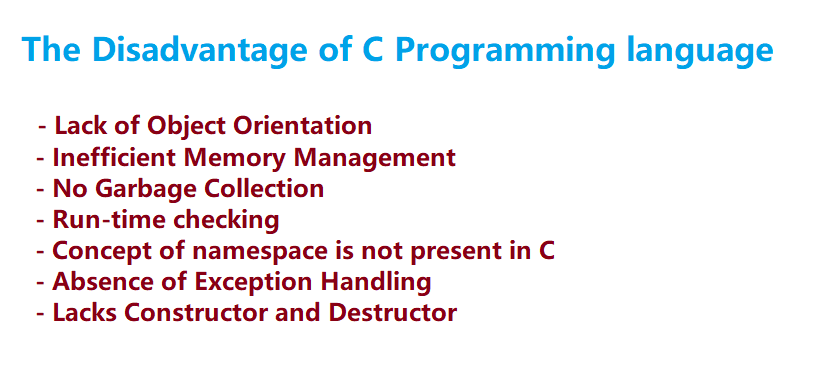
The biggest drawback of the C language is that if your project is complex and requires a large number of developers to update large portions of code, C language may make things exceptionally complicated.
Input and output operations are relatively more complex compared to many other languages. String handling can only be implemented using character arrays, and graphics operations can be complex.
The lack of data encapsulation in the C language is a major disadvantage, which means that C has significant shortcomings in data security, which is also a major difference between C and C++. The syntax restrictions of C language are not very strict, and the type constraints of variables are not strict, affecting the safety of programs, and it does not check for array bounds violations. From an application perspective, C language is more difficult to master than other high-level languages.
Pointers are a major feature of the C language and can be said to be an important reason why C language is superior to other high-level languages. Because it has pointers, it can directly perform operations close to the hardware, but C’s pointer operations have also brought many unsafe factors. C++ has done a good job in this regard by maintaining pointer operations while enhancing safety. Java has canceled pointer operations to improve safety.
1. Lack of Object Orientation
The C language is a powerful procedural programming language that does not support object-oriented programming concepts such as inheritance, polymorphism, encapsulation, abstraction, and data hiding. Unlike OOP languages like Java, Python, and C++, it is not possible to create classes with multiple inheritances, and there are no mechanisms for inheriting methods from parent classes or creating subclasses. This lack of support for OOP makes it difficult to reuse existing code in C.
2. Inefficient Memory Management
The C Language automatically manages all allocated resources, so you don’t need any memory management techniques. However, if you want to use dynamic allocation, you need to allocate memory dynamically using the malloc function, as doing it manually can result in a segmentation fault error. Therefore, it is important to always remember the memory management techniques in C Language.
3. No Garbage Collection
Garbage collection is not a built-in feature of C/C++ languages. Instead, memory management is left to the programmer, who is responsible for allocating and freeing memory as needed. This can make memory management in C/C++ more challenging than in other languages that have automatic garbage collection, but it also gives the programmer greater control over how memory is used and can lead to more efficient code. There are some libraries and tools available to assist with memory management in C/C++, but they are not as robust as automatic garbage collection in other languages.
4. Run-time checking
In the C programming language, errors are not detected during run-time, but rather during compile-time. The compiler checks for syntax errors, type errors, and other issues in the code and reports them back to the programmer. However, there are some errors that can only be detected at run-time, such as memory access violations or null pointer dereferences.
As for the second point, it is true that the C language does not require variables to be declared before their use, but it is considered good programming practice to do so. This can be enforced by using compiler flags or coding standards.
5. Concept of namespace is not present in C
It is worth noting that although C does not have built-in support for namespaces, programmers can still achieve similar functionality by using naming conventions and scoping. By organizing functions and variables into logical groups and naming them accordingly, programmers can avoid naming conflicts and make their code more readable and maintainable. However, it does require more effort and discipline from the programmer to implement and maintain namespaces in C code compared to languages with built-in support for namespaces.
6. Absence of Exception Handling
Exception handling is not a built-in feature of the C language. C relies on the programmer to manually check for errors and handle them appropriately. This can lead to code that is harder to read and maintain, as well as making it easier for bugs and errors to slip through unnoticed. However, there are libraries and third-party tools available that can provide some level of exception handling in C programs.
7. Lacks Constructor and Destructor
lack of object-oriented functionalities such as constructors and destructors, which require manual construction and destruction of variables.